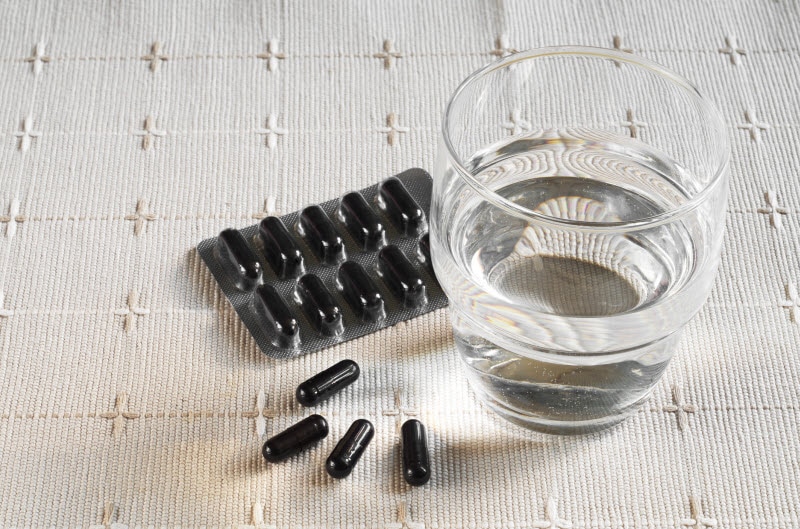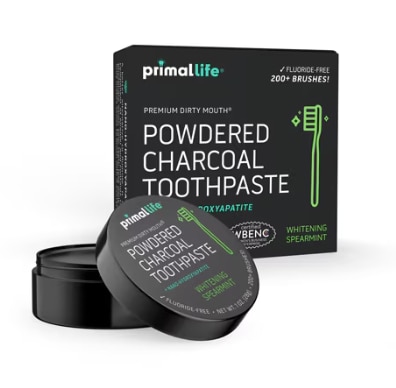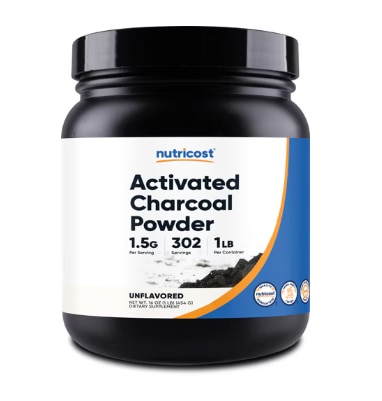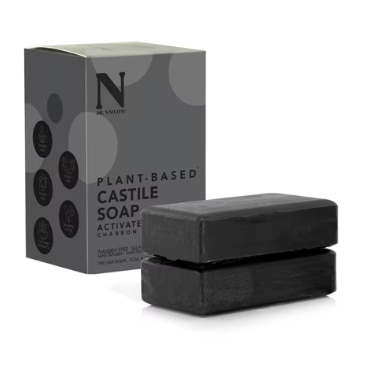Dozens of once-secret holistic health remedies have recently gone mainstream. Ayurvedic skincare, plant-based milk, ozone therapy, homeopathy, essential oils and adaptogenic herbs—to say nothing of yoga, meditation and acupuncture—have officially left their niche neighborhoods and become as commonplace and esteemed as restorative sleep and regular exercise.
Amidst the ongoing buzz in the alternative wellness scene, it’s difficult to decide what to adopt and what to leave to the more intrepid spirits. (Dry scooping and snail facials, anyone?) But if there’s one natural health solution to keep in your bag of tricks, it’s activated charcoal.
You might immediately associate charcoal with grilling and gardening. Perhaps you dove into the trend of “goth lattes,” or the fleeting fad of adding activated charcoal to the coffeehouse classic. Quite possibly, you’ve seen, and maybe even used, charcoal-enhanced oral hygiene and beauty products, whether it was a toothpaste, a body scrub, or a face mask. Chances are, you’ve seen it as a detox cure on social, or popped a charcoal supplement in hopes of warding off a hangover. No matter where you may be on the spectrum, activated charcoal boasts a bevy of potential benefits worth contemplating.
Indeed, utilizing activated charcoal in the name of wellness dates back centuries. Studies show that its earliest recorded therapeutic use has its roots in Ancient Egypt, when it was employed for everything from mitigating the odor of wounds to treating gastrointestinal complications. Hippocrates and Pliny used it to dampen the symptoms of vertigo and epilepsy, while ancient Hindus cherished it for its antiseptic properties. And in the 1800s, charcoal was called upon in emergencies when one accidentally ingested poison. (Fun fact: In 1813, the French chemist Michel Bertrand downed arsenic mixed with activated charcoal and survived, if ever there’s a testament to its potency.)†
Since then, charcoal quietly demonstrated its value in small circles, most notably as an antidote to overdoses and poisoning, before it started surfacing as a detoxifying agent in IG-worthy lemonades and trendy ice cream. Its promise, however, extends well beyond these circumstances—and, like with any craze, not all of its purported merits are legit.†
Let’s dive into activated charcoal’s composition, its real capacity for healing, and its leading benefits.
What is activated charcoal?
Unlike those briquettes you might find at Home Depot, activated charcoal is charcoal—or the porous, black material that’s created by heating organic matter like wood, peat, coconut husks, petroleum and bamboo in an environment that’s devoid of oxygen—that goes through a second process during which it’s further subjected to hot air, chemicals or steam, again at an extremely high temperature. This alters the interior structure of the organic matter and turns it into an ashy powder that can be used in food and supplements.†
Heating it to this high of a temperature is also where its magic rests. The process results in a material with not only microscopic holes but also a larger internal surface area than the traditional, un-activated charcoal you might toss into your barbeque. This enables activated charcoal to function, if you will, like a magnet for unwanted substances.†
How does activated charcoal work in the body?
Also referred to as activated carbon, activated charcoal first and foremost works as a binder. After it’s ingested, it doesn’t get absorbed in your digestive tract; rather, its negative charge allows it to soak up positively-charged compounds like gases, chemicals and toxins. These molecules then cling to the activated charcoal instead of traveling through your gut and into your bloodstream (and the rest of your body). Once the charcoal has absorbed these gases and chemicals, they’re eliminated through your stool. Think of activated charcoal, then, as a powerful, internal sponge that cleans up toxic spills.†
What are the benefits of activated charcoal?
Activated charcoal’s capacity to trap (and banish) toxins and gases is the primary reason it went from a relatively unknown compound to one of the most popular wellness trends of 2017. While the social media images alone are compelling—there’s something ghoulishly delightful about seeing typically “sunny” foods turned into deep-black pieces of edible art—activated charcoal’s potential benefits are, well, more than meets the eye. In fact, activated charcoal may:
1. Mitigate flatulence and tone down bloating†
Plenty of foods are notorious for provoking flatulence and bloating, particularly cruciferous vegetables, beans, lentils and, for those who are lactose-intolerant, dairy products.
Activated charcoal can be a boon for diminishing the discomfort and embarrassment these eats might prompt or provide relief after an especially rich meal that’s filled with foods you don’t normally consume. (Again, this is thanks to its ability to lure gases its way.) Indeed, a small 2017 study on patients with small intestinal bowel overgrowth (SIBO) experienced less gas and tummy pain after taking a combination of activated charcoal and simethicone (an OTC anti-gas agent) for 10 days.†
Two options to try: Nature’s Way Activated Charcoal, which dials down occasional gas, and Nature Craft’s Activated Charcoal. With 1200mg of activated charcoal per serving, this supplement offers regularity and bloating support.†
2. Encourage skin healing†
Recall how Ancient Egyptians used activated charcoal? Its potential effects on wounds remain to this day. More specifically, activated charcoal may mop up bacteria in the skin, thus providing skin injuries with a clean, sanitary “space” to heal. Further, a study published in the Journal of Wound Care found that activated carbon cloths demonstrate promise as a cost-effective wound dressing.†
3. Aid in mold detox†
When you hear the word “detox,” your mind might instantly shift to Dry January or juicing. And yet, mold detoxes are just as popular: Chronic exposure to mold—such as mildew in an old building with poor ventilation—can lead to a variety of health issues ranging from brain fog to joint and soft tissue pain. (This is due to the mycotoxins that mold releases into the air.) It’s said that activated charcoal may have the facility to bind to these mycotoxins and downplay their negative consequences.†
4. Help moderate temporary instances of diarrhea
Food intolerances, food sensitivities, parasites, viruses and Chron’s disease have something in common: They can all cause loose, watery stools. Activated charcoal’s absorbent abilities can be exceptionally helpful in this regard. Some experts indicate that activated charcoal can also assuage the abdominal tightness that often arrives with diarrhea and promote stool consistency.†
Are there any concerns with casually taking activated charcoal?
In a word, yes.Its bounce from the back of the health food store to a social darling prompted hundreds of physicians to voice their concerns about taking it outside of a medical setting, without your healthcare provider’s express recommendation, and as nonchalantly as echinacea. Here’s why:
Activated charcoal is nonselective
Activated charcoal certainly does a superb job of absorbing toxins, whether those toxins are from an oral medication you had an adverse reaction to or your dog thought antifreeze looked delicious. And yet, it’s indiscriminate in what it absorbs—and can ultimately sponge up key vitamins, minerals, other medications, oral contraceptives, antibiotics and more. This can be especially hazardous for those whose medications, and their dosages, are of utmost importance.†
To phrase it differently, you should not take activated charcoal as you would a multivitamin or your daily probiotic with the hope that it’ll provide a detox-in-a-bottle: Doing so may deplete you of the very medications and nutrients you need to thrive. Besides, your body possesses its own natural detoxification abilities, chiefly through your liver and kidneys.†
Activated charcoal is not a hangover cure
For those who are itching to imbibe, the idea that they can take an activated charcoal supplement before bed and wake up clear-headed and nausea-free may seem like a no-brainer. There’s danger in this thinking, though: Not only does your system absorb alcohol at a swift rate—according to Stanford Medicine, the effects of alcohol can be felt in as little as 30 to 45 minutes, even if this is contingent upon your weight, age, genetics and whether you’ve eaten (among other factors)—but alcohol can also escape activated charcoal’s clutch.†
Meaning, it doesn’t bind well to activated charcoal in the same manner as, say, acetaminophen, and lead some individuals to consume more craft cocktails than they should. A better bet is to curb your alcohol consumption on a night out, drink an abundance of water, pile your plate with foods high in zinc and vitamin B (such as eggs, cheese, peanuts and fish)—or avoid drinking altogether.
Activated charcoal should not be your go-to solution for stomach upset
There are absolutely times when activated charcoal can be used to settle a bloated, gassy tummy or a case of diarrhea, but you may want to refrain from routinely taking it so you can indulge in any number of dishes: Activated charcoal may contribute to its own set of gastrointestinal issues, including constipation, diarrhea and vomiting.
Further, activated charcoal may cause intestinal blockage in some people, which can be especially concerning for those with gut motility issues. To nourish your gut health on a regular basis, turn to teas instead: Ginger, fennel and peppermint tea may alleviate nausea, support digestion and temper bloating. (They’re also a tasty after-dinner treat to boot.)†
Activated charcoal should be administered in an emergency room if you suspect a poisoning
Perhaps your little one accidentally swallowed a household cleanser, or you believe your friend overdosed. In any case in which you believe a poisoning has occurred, seek medical attention right away rather than taking an activated charcoal supplement at home: Only a medical professional can determine what you or a loved one needs in these cases.
Activated charcoal: FAQs
If you still have questions about activated charcoal, you’re not alone. Studies on the compound are more or less in their infancy, while the internet positively overflows with misleading information. With this in mind, let’s tune into some of the most frequently asked questions:
Q: Is activated charcoal an effective tooth whitener?
A: This remains up for debate. Some experts in the dental field say that activated charcoal can soften the sight of stains on the surface of teeth, while a 2019 study (albeit on animals) found that activated charcoal wasn’t nearly as valuable as traditional teeth whiteners like hydrogen peroxide. What’s more, activated charcoal cannot prevent teeth yellowing or acute stains. Further, its abrasive nature may cause your enamel to erode and result in a slew of issues, including gum disease and tooth decay.†
Q: What about its inclusion in skincare products?
A: This, too, is largely unclear. In theory, activated charcoal could help unclog pores and draw out impurities in the skin through its binding actions; that said, there hasn’t been enough studies to definitively state its efficacy in skincare products. Additionally, activated charcoal’s coarse-grained texture may precipitate irritation and peeling in people who have sensitive complexions.
Q: Can you use activated charcoal as a deodorant?
A: Possibly. Activated charcoal’s aptitude for absorbing bacteria might suggest that it could be a novel way to sop up unwanted body odors. At the same time, there haven’t been any conclusive studies on its deodorizing potential, even if some experts, such as Henry Ford Health, say that it may help those with fish odor symptom (trimethylaminuria). If you’re in the market for an alternative way to smell great after a sweat sesh, Hume’s Aluminum-Free After Rain deodorant is powered by plants, cruelty-free and effective.
Q: Can you take activated charcoal if you’re pregnant or breastfeeding?
A: Similarly, there are no conclusive studies on activated charcoal’s safety for pregnant or breastfeeding mothers. To that end, it’s best to err on the side of caution.
Q: If I get my doctor’s go-ahead, can I go with any activated charcoal supplement?
A: This is unadvisable—and not just because several supplements come with unproven claims that may lead to disappointment. A handful of activated charcoal supplements feature sorbitol, which can function as a laxative in some people and result in diarrhea (and undermine your intentions if you’re taking activated charcoal to help with diarrhea). Ensure you opt for a reputable brand and a product that’s made without additives, such as Country Life’s Activated Coconut Charcoal Powder.†
Q: Is activated charcoal a sound choice for staving off weight gain?
A: You may have heard that activated charcoal can be a windfall for those who are set on losing weight or preventing weight gain. Some of this may stem from a 2022 study featured in Frontiers in Nutrition, which indicated that activated charcoal may beat back insulin resistance and obesity in mice that were fed high-fat diets.†
Regardless, there’s not sufficient evidence to explicitly suggest that activated charcoal should be taken for weight loss. As old-fashioned and even dull as it may seem, landing on your ideal, healthiest weight is best achieved through a balanced diet brimming with whole, nutritious foods, consistent exercise, stress-busting activities and quality sleep—which, after all, are the choicest ways to stay active, and activated, yourself.
†These statements have not been approved by the Food and Drug Administration. These products are not intended to diagnose, treat, cure or prevent disease.




